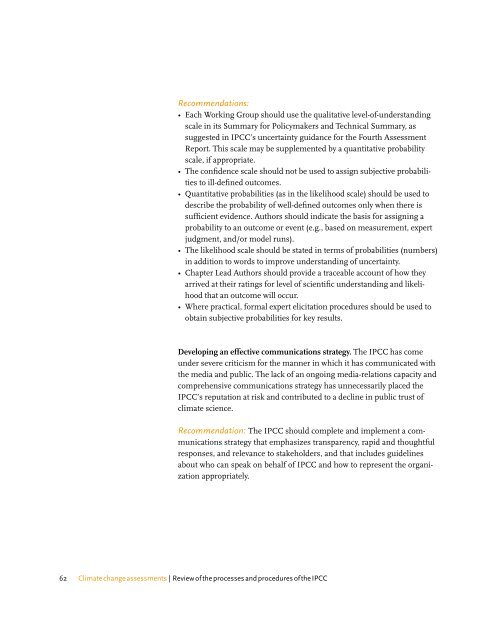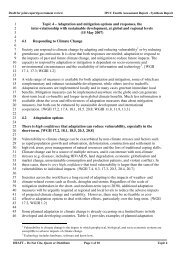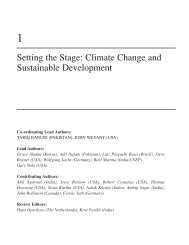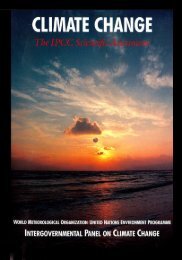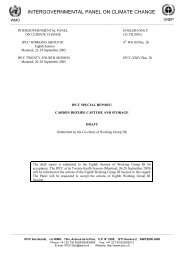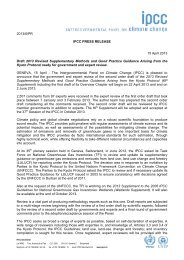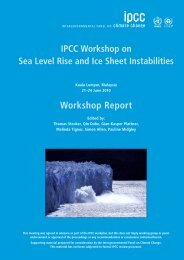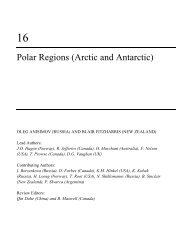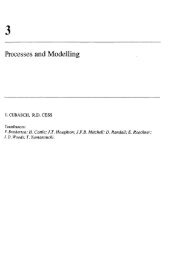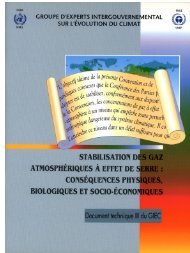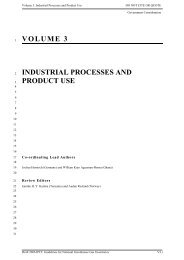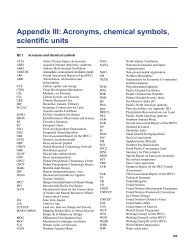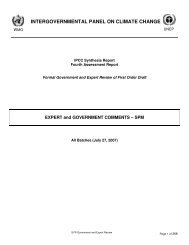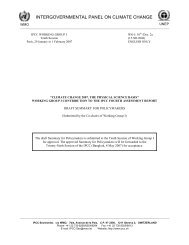Climate change assessments Review of the processes and ...
Climate change assessments Review of the processes and ...
Climate change assessments Review of the processes and ...
Create successful ePaper yourself
Turn your PDF publications into a flip-book with our unique Google optimized e-Paper software.
Recommendations:<br />
• Each Working Group should use <strong>the</strong> qualitative level-<strong>of</strong>-underst<strong>and</strong>ing<br />
scale in its Summary for Policymakers <strong>and</strong> Technical Summary, as<br />
suggested in IPCC’s uncertainty guidance for <strong>the</strong> Fourth Assessment<br />
Report. This scale may be supplemented by a quantitative probability<br />
scale, if appropriate.<br />
• The confidence scale should not be used to assign subjective probabilities<br />
to ill-defined outcomes.<br />
• Quantitative probabilities (as in <strong>the</strong> likelihood scale) should be used to<br />
describe <strong>the</strong> probability <strong>of</strong> well-defined outcomes only when <strong>the</strong>re is<br />
sufficient evidence. Authors should indicate <strong>the</strong> basis for assigning a<br />
probability to an outcome or event (e.g., based on measurement, expert<br />
judgment, <strong>and</strong>/or model runs).<br />
• The likelihood scale should be stated in terms <strong>of</strong> probabilities (numbers)<br />
in addition to words to improve underst<strong>and</strong>ing <strong>of</strong> uncertainty.<br />
• Chapter Lead Authors should provide a traceable account <strong>of</strong> how <strong>the</strong>y<br />
arrived at <strong>the</strong>ir ratings for level <strong>of</strong> scientific underst<strong>and</strong>ing <strong>and</strong> likelihood<br />
that an outcome will occur.<br />
• Where practical, formal expert elicitation procedures should be used to<br />
obtain subjective probabilities for key results.<br />
Developing an effective communications strategy. The IPCC has come<br />
under severe criticism for <strong>the</strong> manner in which it has communicated with<br />
<strong>the</strong> media <strong>and</strong> public. The lack <strong>of</strong> an ongoing media-relations capacity <strong>and</strong><br />
comprehensive communications strategy has unnecessarily placed <strong>the</strong><br />
IPCC’s reputation at risk <strong>and</strong> contributed to a decline in public trust <strong>of</strong><br />
climate science.<br />
Recommendation: The IPCC should complete <strong>and</strong> implement a communications<br />
strategy that emphasizes transparency, rapid <strong>and</strong> thoughtful<br />
responses, <strong>and</strong> relevance to stakeholders, <strong>and</strong> that includes guidelines<br />
about who can speak on behalf <strong>of</strong> IPCC <strong>and</strong> how to represent <strong>the</strong> organization<br />
appropriately.<br />
62 <strong>Climate</strong> <strong>change</strong> <strong>assessments</strong> | <strong>Review</strong> <strong>of</strong> <strong>the</strong> <strong>processes</strong> <strong>and</strong> procedures <strong>of</strong> <strong>the</strong> IPCC


